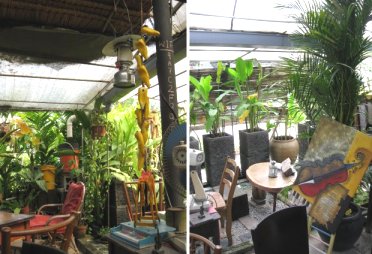Didn't drive home by myself, so I hitched a ride with an uncle and got snared in that awful five-plus-hour traffic jam at the Tanjung Malim rest stop. The snarl in human and vehicular traffic combined the Saturday balik kampung rush for the long weekend and the annual CNY exodus. People were taking pictures of the mayhem with their phones.
For the ride home, I hitched a ride with my sister and brother-in-law. The whole trip took about four hours. My poor heart shrivelled several times as he floored it. I'm treating my car better so it'll be fit for next year's CNY holiday. I drive slower, but it's better for my nerves.
Hey, we all age.
So I went home and saw my review of Luis Urrea's book in the papers. In it, I wondered if the book would be banned in Arizona, which is gaining a reputation for becoming increasingly hostile to Hispanics.
Turns out that several of his non-fiction works have been affected by the plan to end allegedly biased and politically charged ethnic studies in the US state. As I see it, critics see it as an attempt to stamp out Mexican-American culture in Arizona, which has a sizeable Hispanic population. Urrea had some choice words about the issue.
"Wait a minute", this guy appears to be saying. "Nothing's set in stone yet. And it's only in Tucson." Unless the air clears over the issue, Mexican-American writers are likely to continue voicing their displeasure over the matter.
- iBooks Author, a free, downloadable Mac OS X application for creating e-books has landed. Though the simplicity of the app is appealing, the folks at Writers Beware are urging (would-be) users to read the fine print before trying it out and submitting the output to iBooks.
One reason is Apple's alleged attempt to fix the e-book file format used by the app. Ed Bott at ZDNet is crying foul, saying that Apple's move will hamper the application of an open standard for e-books.
Meanwhile, the big fruit appears to be in trouble over e-book price fixing. - The Chicago Tribune introduces Printers Row, a new Sunday books section that the paper's subscribers can purchase at an additional US$99 per year. Featuring 24 pages of book reviews, author interviews, Chicago-focused literary news and a weekly bonus book of short fiction, the "journal" will be delivered with the Sunday paper and online beginning 26 February. Bonuses include access to member-only book events, such as the Tribune series of author conversations and discussion groups.
Not a Trib subscriber? Buy single copies of Printers Row from Amazon at US$2.99 each. - E-readers and tablets spur growth in sales of children's books. Meanwhile, it's been reported that there are 21 Academy Award nominations this year for films based on kids' books. Hugo, based on The Invention of Hugo Cabret by Brian Selznick, has 11 nominations, followed by War Horse with six nominations. Both films are fighting for the Best Picture category. Just what we need: another boost for the YA genre.
- From what I can read about this bit of news, Amazon's New York book-publishing arm is getting publisher Houghton Mifflin Harcourt to sell its books under an imprint called New Harvest. The writer seems flabbergasted, partly because the books are Amazon publications, which some retailers have sworn to avoid.
- Digital comic book startup Graphicly plans to fills a void amidst the hubbub over e-book publishing. They estimate that over 300,000 self-published creators will start selling their own comic books and graphic novels this year.
- The story of Larry Kirshbaum, the guy fronting Amazon's publishing land grab (I'm being dramatic). And here's someone wondering if Amazon is killing or improving the book business.
- Banned books are hot in Vietnam. At some point, these censor-happy governments should just throw their hands up and sigh, "Why bother?"
- Book publisher Harlequin has bought Heartsong Presents Book Club, which provides its members with Christian romance novels. ...Christian romance novels? How does that even work?
- As Nigerian authors look west for fame and recognition, they'll probably have to deal with the continent's apparent reluctance in the shift to e-books. ...No, no jokes about Nigerian e-book publishing scams, please.
- How do those best-seller lists work? Says Paul Takushi, UC Davis Store's book promotions and marketing manager: "The creation of a best-seller list is the most nebulous thing you will ever encounter. No one really knows how it's done." There you go.
- The Hocking-esque tale of an Oak Harbor graduate who made self-publishing magic with Wattpad.com, a "YouTube for writers". Seems the web site helped her book get 15 million reads - before self-publishing it through Amazon.com's CreateSpace.
- University e-presses are, it seems, not lightweight affairs.
- A book reviewer's thoughts after reading a digital copy of John Burdett's Vulture Peak from online book review service NetGalley. Basically, the future is coming and there's no stopping it.
- Next: interactive e-books, ala Steve Jackson. What if you could choose your own ending? ...No, don't think that applies to non-fiction...
- Author and self-publishing guru Stephanie Chandler talks about "the numerous advantages of writing, self-publishing and how it can enhance one's business".
Categories:
Book Marks























